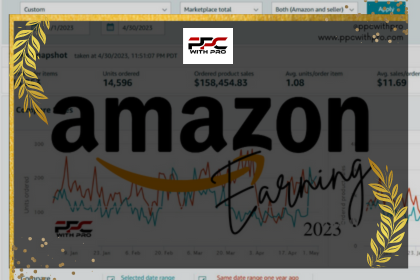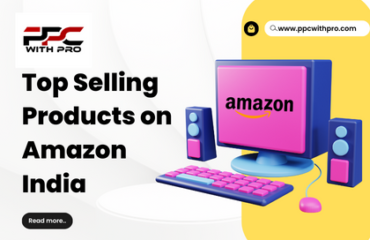
How to Find Keywords for Amazon PPC?
Keywords play a crucial role in the success of Amazon PPC campaigns. By targeting the right keywords, sellers can increase visibility, drive more traffic, and ultimately boost sales. In this article, we will explore the process of how to find keywords for Amazon PPC campaigns, along with strategies to optimize their use.
Introduction
As an Amazon seller, you want your products to appear in front of potential customers when they search for relevant items. That’s where Amazon PPC (Pay-Per-Click) comes into play. It is an advertising model that allows sellers to promote their products by bidding on keywords. When someone searches for those keywords, the sponsored ads appear at the top or within the search results.
Importance of Keywords for Amazon PPC
Keywords are the foundation of any successful PPC campaign. They determine when and where your ads will appear. By targeting the right keywords, you can increase the likelihood of your ads being shown to the right audience, which can lead to higher conversion rates and a better return on investment (ROI).
Understanding Amazon PPC
What is Amazon PPC?
Amazon PPC is an advertising platform that enables sellers to promote their products directly on Amazon’s marketplace. It operates on a pay-per-click model, where sellers only pay when a user clicks on their ad. The goal is to generate more sales and increase product visibility.
How does Amazon PPC work?
When creating an Amazon PPC campaign, sellers choose specific keywords they want to target. They bid on these keywords, indicating the maximum amount they are willing to pay for a click. The higher the bid, the more likely their ad will be displayed for relevant searches. However, winning the bid doesn’t guarantee the top position; Amazon also takes into account the relevance and quality of the ad.
The Role of Keywords in Amazon PPC
Relevance and Search Terms
Relevance is key when it comes to selecting keywords for your Amazon PPC campaigns. You want to choose keywords that closely match the product you are selling. It’s important to understand the search terms your potential customers are using and incorporate them into your keyword strategy.
Choosing the Right Keywords
To find the most effective keywords, start by brainstorming a list of terms related to your product. Put yourself in the shoes of your target audience and think about what they might search for. Additionally, use tools specifically designed for Amazon keyword research to discover relevant keywords and their search volumes.
Tools for Finding Keywords
Amazon Keyword Research Tools
Amazon provides its own keyword research tools such as Amazon Autocomplete and Amazon’s Search Term Report. These tools can provide insights into what customers are searching for on the platform. By analyzing the search terms and phrases, sellers can identify keywords to target in their campaigns.
Third-Party Keyword Research Tools
There are also numerous third-party keyword research tools available that provide more comprehensive data and analysis. Tools like Jungle Scout, Helium 10, and MerchantWords offer features such as search volume estimates, competition analysis, and keyword suggestions.
Researching Competitor Keywords
Analyzing your competitors can provide valuable insights into their keyword strategies. Identify successful sellers in your niche and examine the keywords they are bidding on. By understanding what keywords your competitors are targeting, you can refine your own strategy and find opportunities to differentiate yourself.
Long-Tail Keywords for Amazon PPC
Long-tail keywords are specific phrases that are more targeted and have lower competition. While they may have lower search volumes, they often have higher conversion rates. Incorporating long-tail keywords into your Amazon PPC campaigns can help you reach a more qualified audience and increase the chances of conversions.
Analyzing Keyword Performance
Regularly monitoring and analyzing the performance of your keywords is essential for optimizing your campaigns. Amazon provides data on impressions, clicks, conversions, and other metrics that can help you identify which keywords are driving results and which ones need adjustment.
Keyword Optimization Strategies
Keyword Placement
Place your primary keywords strategically in your product title, bullet points, product description, and backend search terms. This will help improve the visibility of your products in search results and increase the relevance of your ads.
Negative Keywords
Negative keywords are terms you want to exclude from triggering your ads. By identifying and adding negative keywords to your campaigns, you can prevent your ads from being shown for irrelevant searches, saving your budget for more relevant clicks.
Bid Management
Regularly review and adjust your bids based on the performance of your keywords. Increase bids for high-performing keywords to maintain or improve their positions, and decrease bids for underperforming keywords to conserve budget.
Tracking and Adjusting Keywords
Continuously track the performance of your keywords and make necessary adjustments. Monitor changes in search trends, customer behavior, and competitor strategies. Stay proactive and adapt your keyword strategy accordingly to maintain a competitive edge.
The Impact of Seasonality on Keywords
Consider the seasonality of your product and adjust your keyword strategy accordingly. Different keywords may perform better during specific times of the year. By analyzing historical data and understanding seasonal trends, you can optimize your campaigns for maximum effectiveness.
Testing and Experimentation
Don’t be afraid to test different keyword variations and strategies. Experiment with new keywords, ad copy, and landing page optimizations to see what works best for your products. A/B testing can help you refine your campaigns and improve overall performance.
Optimizing Product Listings for Keywords
In addition to using keywords in your PPC campaigns, it’s important to optimize your product listings. Incorporate relevant keywords in your titles, bullet points, descriptions, and backend search terms. This will enhance your organic visibility and align with your PPC efforts.
Monitoring and Adapting to Changes
The world of e-commerce and PPC advertising is dynamic. Stay updated with the latest trends, algorithm changes, and best practices. Regularly monitor your campaigns, analyze data, and adapt your keyword strategy accordingly to stay competitive.
Conclusion
Finding the right keywords for your Amazon PPC campaigns is essential for driving traffic, increasing conversions, and boosting sales. By understanding the importance of keywords, leveraging research tools, analyzing competitor strategies, and optimizing your campaigns, you can maximize the effectiveness of your advertising efforts on Amazon.
Frequently Asked Questions (FAQs) – How to Find Keywords for Amazon PPC?
1. How many keywords should I target in my Amazon PPC campaign?
It’s recommended to start with a focused set of keywords and gradually expand based on performance. It’s better to target a smaller number of highly relevant keywords rather than casting a wide net with less relevant terms.
2. Can I use the same keywords for both organic and PPC campaigns?
Yes, you can use the same keywords for both organic and PPC campaigns. In fact, aligning your keyword strategy across both can enhance your overall visibility and increase the chances of conversions.
3. How often should I review and adjust my keyword bids?
Regularly monitoring your keyword performance is crucial. Review and adjust your keyword bids based on their performance and your advertising goals. Consider factors such as click-through rates, conversion rates, and ROI when making bid adjustments.
4. Are long-tail keywords more effective than broader keywords?
Long-tail keywords tend to be more targeted and specific, which can result in higher conversion rates. While they may have lower search volumes, they often attract more qualified traffic. It’s recommended to incorporate a mix of both long-tail and broader keywords in your campaigns.
5. How long does it take to see results from Amazon PPC campaigns?
The time it takes to see results can vary depending on several factors, including your budget, competition, and product niche. It’s important to give your campaigns enough time to gather sufficient data and optimize them based on performance. It’s typically recommended to allow campaigns to run for at least a few weeks before making significant adjustments.
Let’s Connect “PPCwithPRO” – Amazon Marketing Agency in India
Are you an Amazon seller looking to streamline and optimize your PPC (Pay-Per-Click) advertising campaigns? Look no further! Connect with PPCwithPRO, a trusted provider of Amazon Virtual Assistant services, to take your Amazon business to new heights.
Who is PPCwithPRO?
PPCwithPRO is a highly skilled team of Amazon experts specializing in PPC management and optimization. With their in-depth knowledge and experience in Amazon advertising, they can help you maximize the effectiveness of your PPC campaigns and drive targeted traffic to your product listings.
What is an Amazon Virtual Assistant?
An Amazon Virtual Assistant is a professional service provider who assists Amazon sellers in managing various aspects of their business. This includes tasks such as PPC campaign management, keyword research, listing optimization, competitor analysis, and more. They work remotely, providing valuable support to enhance your Amazon selling experience.
Why should you connect with PPCwithPRO?
- Expertise in Amazon PPC: PPCwithPRO has a proven track record of success in managing Amazon PPC campaigns. Their team stays updated with the latest trends and strategies, ensuring your campaigns are optimized for maximum visibility and profitability.
- Customized Solutions: They understand that every Amazon seller’s needs are unique. PPCwithPRO provides tailored solutions to meet your specific business goals and budget, ensuring you get the most out of your advertising investments.
- Time and Cost Savings: By outsourcing your PPC management to PPCwithPRO, you can focus on other important aspects of your business, such as product sourcing, inventory management, and customer service. This saves you valuable time and resources.
- Data-Driven Approach: PPCwithPRO leverages advanced analytics and data-driven insights to make informed decisions about your PPC campaigns. They continuously monitor and analyze performance metrics to optimize your ads for better results.
- Continuous Monitoring and Optimization: PPCwithPRO doesn’t just set up your campaigns and leave them unattended. They actively monitor your campaigns, make necessary adjustments, and optimize them to drive more sales and improve ROI.
How to connect with PPCwithPRO?
Connecting with PPCwithPRO for Amazon Virtual Assistant services is easy:
- Visit their Website: Go to the PPCwithPRO website (www.ppcwithpro.com) our email id (contact@ppcwithpro.com) to explore their services and learn more about their expertise.
- Contact Them: Reach out to PPCwithPRO through their website’s contact form or by using the provided email address or phone number. Describe your specific requirements and business goals to initiate a conversation.
- Consultation and Assessment: PPCwithPRO will schedule a consultation to understand your needs in detail. They will assess your current PPC campaigns and provide recommendations tailored to your business objectives.
- Service Agreement: Once you agree on the scope of services and pricing, PPCwithPRO will provide a service agreement outlining the terms and conditions.
- Collaboration Begins: After signing the agreement, you will start collaborating with PPCwithPRO’s team of experts. They will work closely with you to implement strategies, monitor performance, and continuously optimize your PPC campaigns.
Unlock the Potential of Your Amazon PPC Campaigns with PPCwithPRO
Don’t let your Amazon PPC campaigns fall short of their true potential. Connect with PPCwithPRO today to access top-tier Amazon Virtual Assistant services that will drive targeted traffic, boost sales, and help you achieve your business goals.
Amazon SPN Network: Click here




Informative Article